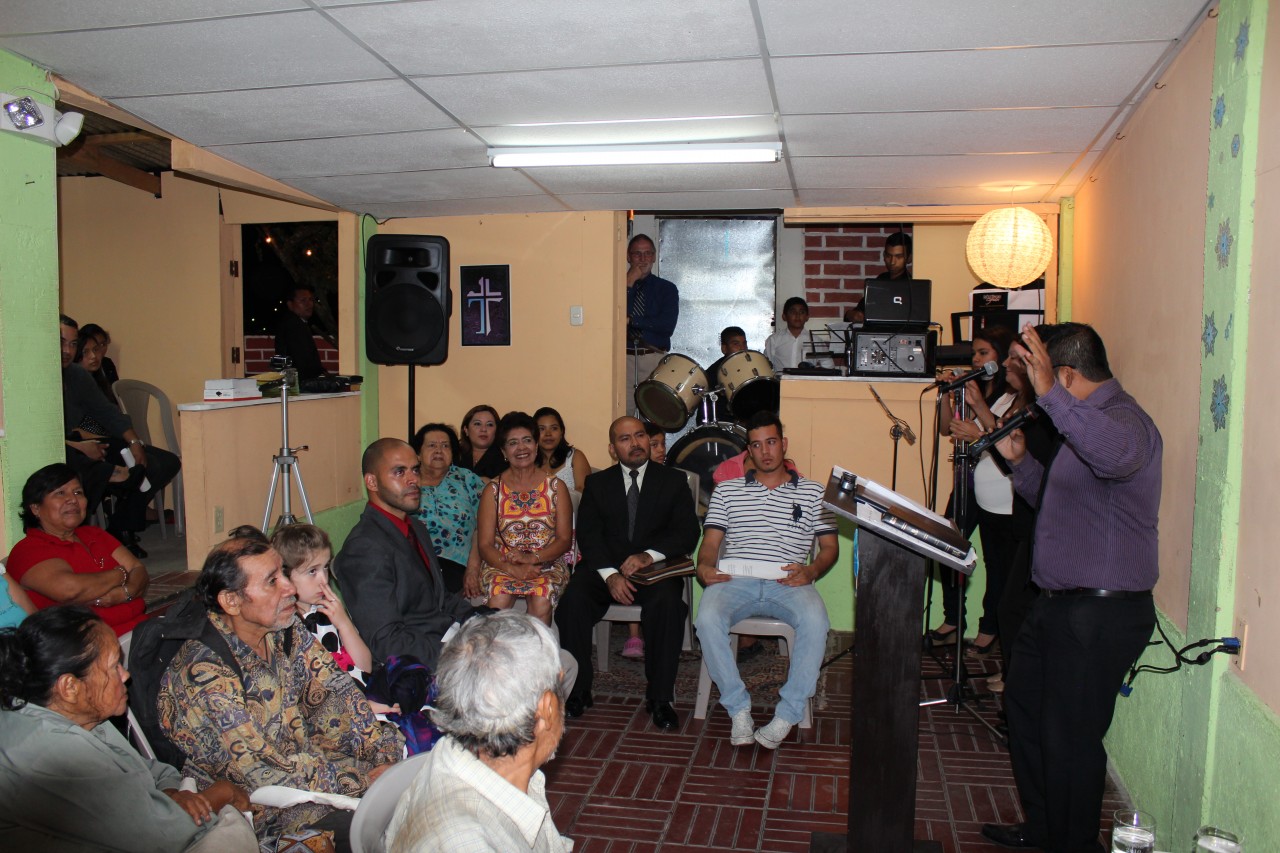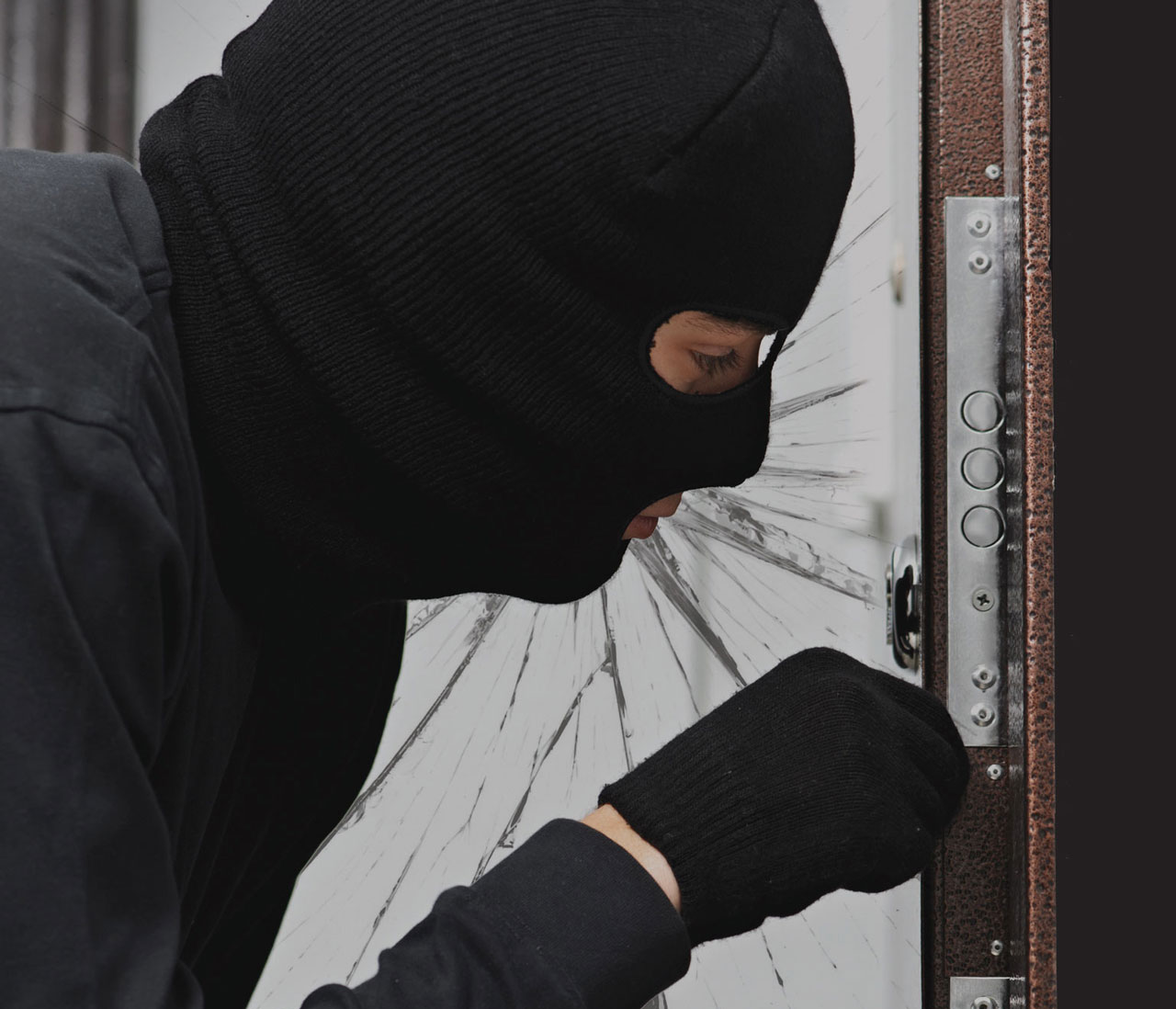
From left, Nick Garland, senior pastor of Broken Arrow, First, in May took part in an ordination service in El Salvador for George Aguilar. Aguilar and Garland became acquainted through an amazing series of events.
BROKEN ARROW—When George Aguilar broke into and vandalized Broken Arrow, First, the last thing he expected to find was love and forgiveness.
But that November night in 2004 changed the 20-year-old’s life forever.
In 2004, Aguilar, a native of El Salvador, who at age 10 came to live with his father in the U.S. as a legal resident, found himself without a place to live and moved in with some young men in Tulsa who were involved in stealing items and converting them to cash.
An impressionable young man who lost his job and needed to send money to help support his mother and younger brother back in El Salvador, Aguilar said he thought the only thing he could do under his circumstances was to steal for a while to take care of his family.
Aguilar and two other men robbed and vandalized 11 churches in the Broken Arrow/Tulsa area during a span of four months, taking cameras, computer modems, guitars, amps and other electronic equipment, and damaging approximately $250,000 of church property. At the Broken Arrow church, the threesome caused about $25,000 in damages to the building and trashed what they didn’t take.
Broken Arrow, First had just completed a debt-free multi-purpose building that included the worship center.
“All of us were angry that anyone would do that to a church,” said Pastor Nick Garland. “It was especially painful for us because we had worked so long to see the completed structure so soon damaged senselessly. I wanted the person(s) caught who did that and wanted them punished.”
When the thieves were apprehended, Aguilar wrote a letter of apology to each of the churches he had vandalized.
“His letter broke my heart,” related Garland. “He conveyed a genuine repentant spirit and requested that he be forgiven. I felt ashamed that I had been quick to want to condemn him without knowing anything about him. When I read his letter, God moved my heart to show me how poorly I had responded to George’s actions.”
Through the help of a police officer who was a member of the church, Aguilar was brought to Garland’s office to meet with him.
“When I walked in, he was seated at a conference table with his head in his hands,” recalled Garland. “He impressed me with his demeanor and decorum.”
Garland said Aguilar stated in his letter that he did not think the pastor could forgive him, that the church could forgive him or that God could forgive him for what he had done.
Garland began the conversation by requesting Aguilar to look at him. Then the pastor asked the young man to forgive him for harsh feelings against him without even knowing him.
“George, I forgave you when I read your letter,” Garland told him. He added, “And I know God can forgive you for He has forgiven me, not only for what I felt toward you, but a long time ago, He forgave me for what I was and gave me a new life in Christ.”
Garland proceeded to tell Aguilar about redemption in Jesus; he prayed and confessed his need of being forgiven and asked to Lord to come into his life and transform him.
Garland told Aguilar that the only thing remaining on his list was forgiveness from the church, and he could not speak for the church, but arranged for a day release for him to attend a worship service.
“On that morning, I told the congregation that the young man who had broken into our church had been apprehended and had written a letter asking for forgiveness,” remembered Garland. “I read his letter, told them George and I had met, that I had forgiven him and that George had asked God to forgive him, but I did not know if the church would.”
Garland asked Aguilar to come to the platform and stand with him. Then he told the church they would have to let him know if they forgave him.
“Suddenly, it looked like a stampede of folks coming to hug his neck, weep tears of joy with him, express their love for him and to truly embrace him,” Garland said. “He got offers for lunch, money given to him to help his mother, three job offers and a host of other clear affirmations.”

Aguilar, a criminal-turned-Christian, works as a church planting minister in El Salvador. In May, his congregation held a special ordination service for him.
Although Aguilar had the forgiveness of God, Garland and the Broken Arrow congregation, he still faced charges for his actions. Per his attorney’s counsel, he pled guilty to two felony second-degree burglary charges and received a deferred sentence, meaning if he stayed out of trouble for five years and paid the court-ordered fines and restitution, the charges would be expunged. He met all the conditions, and his criminal record was cleared. He was adopted by a family in the church, given a room in their home, a job, help to buy a car and begin a new life.
Garland said Aguilar “became the best of what we love to tell when we boast of the greatness of America.
“He became responsible, earned a living, did not look for hand-outs, never again was involved in any misconduct, became active in church, worked with students, went on mission trips, taught English to Internationals and gave his testimony many times.”
However, despite having a clean state record, the U.S. Immigration and Customs Enforcement (ICE) does not recognize deferred sentences and expungements. Aguilar’s guilty plea meant he could have his legal residency stripped and be deported from the U.S. ICE sent a notice to Aguilar in 2009 for him to appear in immigration court for possible deportation. A prosecutor in an administrative court based in Dallas exercised discretion and terminated the case without prejudice in March, 2010. However, a new prosecutor reversed that decision a month later. On Feb. 14, 2011, an immigration judge ordered Aguilar be removed from the U.S., and he was held in custody until his deportation Dec. 9.
Although Aguilar said he was happy to be out of prison, when he arrived in El Salvador, he was defeated.
“Being in El Salvador was hard, because everything was taken away from me, and I had to start over in a country where I did not grow up,” he said. “Even though it was my native country, I did not know how to fit into the culture.”
Things began to turn around for Aguilar when he received an unexpected email from a ministry that works in Central and South America, which had heard of Aguilar’s story and his deportation. He was invited to go on a mission with them in Honduras, and while there, he received additional training in evangelism, got the chance to tell his story on television and radio, and then was invited to do the same type of ministry in Columbia.
“When I got back to El Salvador, I knew I wanted to be an independent missionary, a pastor, sent by my church to minister here,” Aguilar revealed.
His mother operated a small bar in the back of her home to make a living. When Aguilar moved in to live with her, she realized that his preaching would be a conflict with an open bar in her home. After Aguilar prayed for God to close the bar, God answered. A few months later, she agreed to shut it down and gave that space for Aguilar’s church to meet, which he turned into a house of prayer. His congregation is between 60-70 people who come each week to worship. However, the impact of his work is much broader as he has helped with giving food to the indigent and to the hungry who come to church.
Although he says he has hopes of returning to the United States one day with a testimony of God’s goodness in his life during his time in El Salvador, it would be hard to leave because “I am falling in love with the people that I am ministering to, and I have adjusted again to a new lifestyle.”
He added that he is motivated by his dream of establishing a faithful church where he can do what he is happiest doing—teaching the Bible.
“One long-term goal I have is to graduate from seminary and be an ordained pastor,” Aguilar acknowledged.
Part of that dream came true on May 21 when Garland and Kevin Cottrell, Broken Arrow, First’s mission pastor, were in the chapel at San Marcos to lead in the ordination of George Aguilar to the gospel ministry.
“What a night that was,” said Garland. “To ordain a young man who broke into our church and found Jesus 10 years ago and today is a missionary of the Gospel that changed his life forever.”







